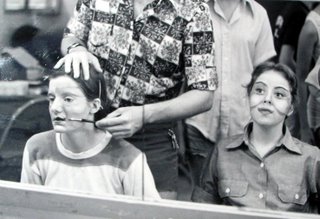
I haven't been in a theatre class since 1979.
And I shouldn't have been surprised, but I was surprised when I attended the first class of Medieval Religious Drama and realized how excited I was to be studying theatre again.
Many things make this class attractive:
1.) The professors are both legendary. Jack Coogan has been part of the Claremont faculty since Noah studied theology here. His gentle but wily spirit, his humor, his passion for worship and the arts all make him a delight to learn from. Lori Anne Ferrell is a brilliant historian, also with a passion for her subject. I don't know her, but I know her work. A few years ago she curated a show at the Huntington Library called The Bible and the People and I was astounded both at the content and the presentation.
2) In addition to studying about medieval mystery plays, we get to stage one!
3) It fulfills a graduation requirement for a worship class related to some art form.
4) Several of my good friends are enrolled.
5) It's not Augustine or Schleiermacher.
6) It's drama. Drama. I get to play again!
On the first night of class, after Jack walked us through the plan for the course and our requirements, he told us that before we could study the medieval plays, we needed to understand the history of theatre before them.
He showed part of a BBC series that discussed the origins of theatre. In all my high school and college drama classes, I had never learned the origin. I knew about the Greek comedy and drama masks, but I didn't know that theatre started with the Greeks. The video connected the beginnings of drama to much earlier religious celebrations that involved choruses of people singing and dancing to honor a god. Theatre began, the narrator said, when the first man stepped from the chorus and began speaking solo. The documentary went on to discuss three known Greek playwrights and their works, focusing at length on Euripides and his play, "The Bacchae."
I sat in the darkened Mudd theatre astounded. Long before the narrator mentioned The Bacchae, I could recognize the play in many of the images. As a high school drama student I had played Choryphaeus, the chorus leader, in a summer drama workshop production at The University of Texas. Even then, I knew we were not grasping the full meaning and depth of the play. We got that it was about drunkenness and we were definitely tittilated by its raw, yet sometimes sensual, overtones, but that's about all we got. It was fun playing wild women. It was fun imagining and making wild costumes. It was even fun chanting in unison. But, 30 years later, I felt an odd sense of satisfaction that, among my theatre education, I got to perform in one of the first plays. I had lived this history, at least for the moments that I had been overtaken by the role of Choryphaeus and transported to Euripedes' world.
Now, I get to experience another important era of theatre and learn about the people who wrote and played these parts and the people for whom they played, traveling from town to town bringing biblical stories to life.
Here are a few photos from that long-ago Bacchae summer:

At the drama workshop, we learned many facets of theatre: costuming, lighting, set design, blocking, directing. And makeup. Check out the body language of the instructor. You can tell by his hand that he wasn't thrilled with my work! But check out my classmate. She did a great job.

At least our director, Stephen Coleman, was easy on the eyes, though he was tough on us, too.

A trio from the chorus in full costume and makeup. That's me in front.

The Company
No comments:
Post a Comment